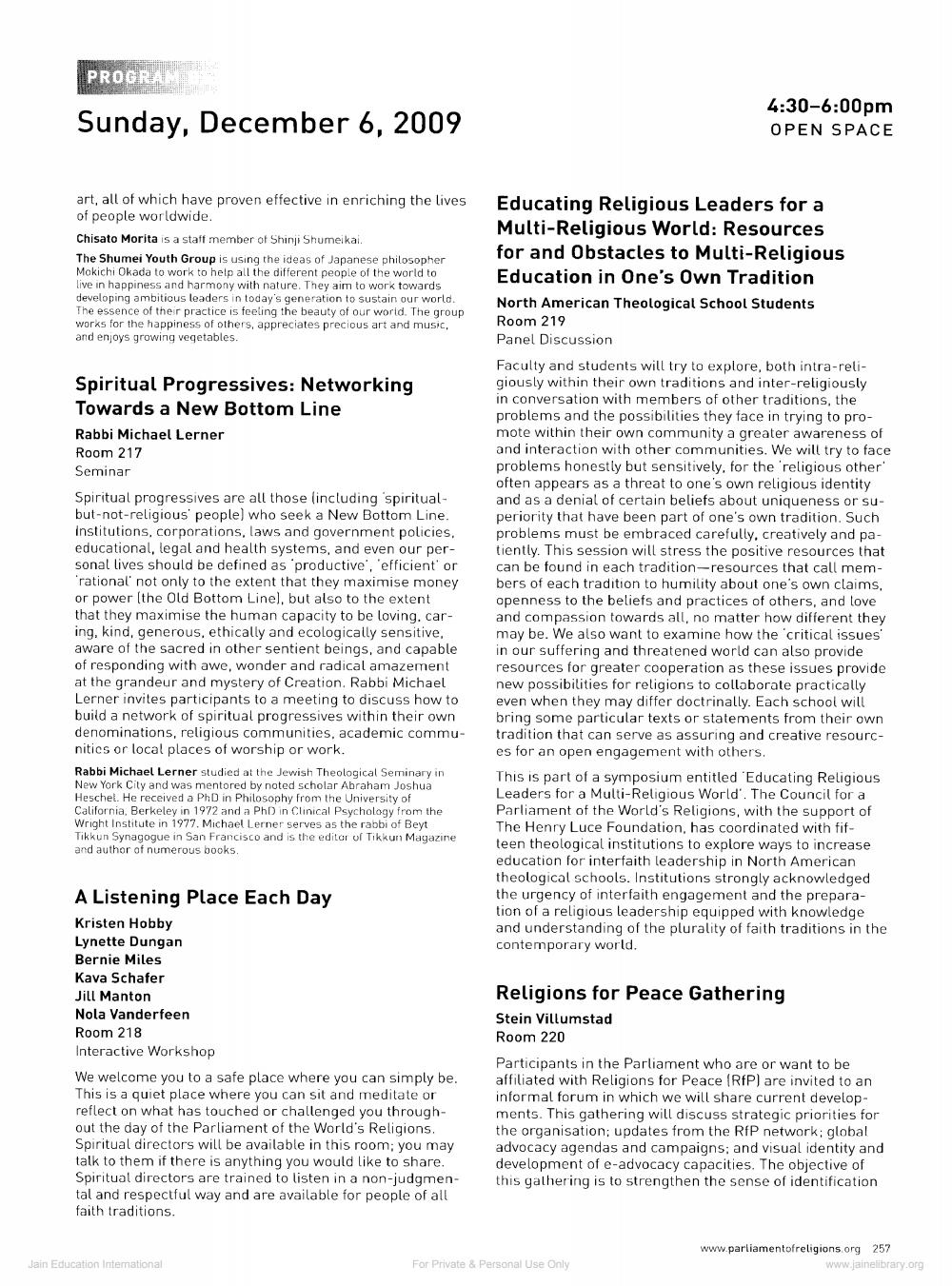________________
PROGRAM Sunday, December 6, 2009
4:30-6:00pm OPEN SPACE
art, all of which have proven effective in enriching the lives of people worldwide. Chisato Morita is a staff member of Shinji Shumeikai. The Shumel Youth Group is using the ideas of Japanese philosopher Makichi Okada to work to help all the different people of the world to live in happiness and harmony with nature. They aim to work towards developing ambitious leaders in today's generation to sustain our world. The essence of their practice is feeling the beauty of our world. The group works for the happiness of others, appreciates precious art and music, and enjoys growing vegetables.
Spiritual Progressives: Networking Towards a New Bottom Line Rabbi Michael Lerner Room 217 Seminar Spiritual progressives are all those (including spiritual but-not-religious people) who seek a New Bottom Line. Institutions, corporations, laws and government policies, educational, legal and health systems, and even our personal lives should be defined as productive', 'efficient or 'rational' not only to the extent that they maximise money or power (the Old Bottom Linel, but also to the extent that they maximise the human capacity to be loving.caring, kind, generous, ethically and ecologically sensitive, aware of the sacred in other sentient beings, and capable of responding with awe, wonder and radical amazement at the grandeur and mystery of Creation. Rabbi Michael Lerner invites participants to a meeting to discuss how to build a network of spiritual progressives within their own denominations, religious communities, academic communitics or local places of Worship or work Rabbi Michael Lerner studied at the Jewish Theological Seminary in New York City and was mentored by noted scholar Abraham Joshua Heschel. He received a PhD in Philosophy from the University of California, Berkeley in 1972 and a PhD in Clinical Psychology from the Wright Institute in 1977. Michael Lerner serves as the rabbi of Beyt Tikkun Synagogue in San Francisco and is the editor of Tikkun Magazine and author of numerous books.
Educating Religious Leaders for a Multi-Religious World: Resources for and Obstacles to Multi-Religious Education in One's Own Tradition North American Theological School Students Room 219 Panel Discussion Faculty and students will try to explore, both intra-religiously within their own traditions and inter-religiously in conversation with members of other traditions, the problems and the possibilities they face in trying to promote within their own community a greater awareness of and interaction with other communities. We will try to face problems honestly but sensitively, for the 'religious other often appears as a threat to one's own religious identity and as a denial of certain beliefs about uniqueness or superiority that have been part of one's own tradition. Such problems must be embraced carefully, creatively and patiently. This session will stress the positive resources that can be found in each tradition-resources that call members of each tradition to humility about one's own claims, openness to the beliefs and practices of others, and love and compassion towards all, no matter how different they may be. We also want to examine how the critical issues in our suffering and threatened world can also provide resources for greater cooperation as these issues provide new possibilities for religions to collaborate practically even when they may differ doctrinally. Each school will bring some particular texts or statements from their own tradition that can serve as assuring and creative resources for an open engagement with others. This is part of a symposium entitled 'Educating Religious Leaders for a Multi-Religious World'. The Council for a Parliament of the World's Religions, with the support of The Henry Luce Foundation, has coordinated with fifteen theological institutions to explore ways to increase education for interfaith leadership in North American theological schools. Institutions strongly acknowledged the urgency of interfaith engagement and the preparation of a religious leadership equipped with knowledge and understanding of the plurality of faith traditions in the contemporary world.
A Listening Place Each Day Kristen Hobby Lynette Dungan Bernie Miles Kava Schafer Jill Manton Nola Vanderfeen Room 218 Interactive Workshop We welcome you to a safe place where you can simply be. This is a quiet place where you can sit and meditate or reflect on what has touched or challenged you throughout the day of the Parliament of the World's Religions. Spiritual directors will be available in this room; you may talk to them if there is anything you would like to share. Spiritual directors are trained to listen in a non-judgmental and respectful way and are available for people of all faith traditions.
Religions for Peace Gathering Stein Villumstad Room 220 Participants in the Parliament who are or want to be affiliated with Religions for Peace (RfP) are invited to an informal forum in which we will share current develop ments. This gathering will discuss strategic priorities for the organisation; updates from the RIP network; global advocacy agendas and campaigns; and visual identity and development of e-advocacy capacities. The objective of this gathering is to strengthen the sense of identification
www.parliamentofreligions.org 257
www.jainelibrary.org
Jain Education International
For Private & Personal Use Only




